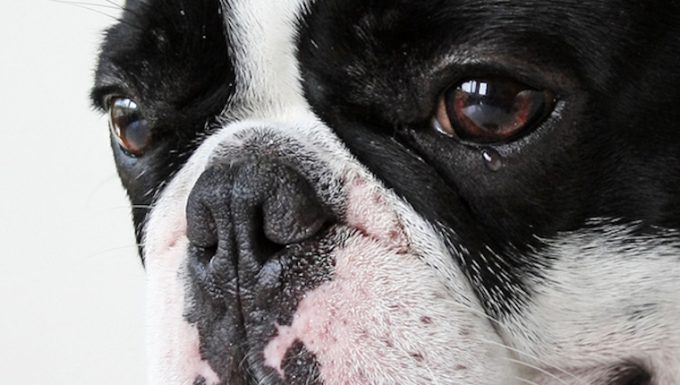Hypopyon in dogs happens when a group of white blood cells form at the front of the eye. The cells that are formed look like pus.
The condition is almost always caused by a different underlying condition.
Unfortunately, the condition can lead to a loss of sight. So it’s important to get help from your vet if you notice any symptoms. Although thankfully it is quite a rare condition in dogs.
If you see the signs of hypopyon in your dog, then get to a veterinarian for a proper diagnosis and treatment.
Here’s what you should know about the symptoms, causes, and treatments for the condition.
Symptoms of Hypopyon in Dogs
Hypopyon in dogs produces a range of symptoms. For instance, some of the most common symptoms include:
- A cloudy looking eye
- A yellow-ish looking eye
- Rubbing at the eye a lot
- Squinting a lot
- Producing a lot of tears
- Swollen eyelids
- Blinking a lot
- Loss of vision
Causes of Hypopyon in Dogs

The cause of the condition is another underlying cause. For example, the following can cause the condition:
- Bacterial infection
- Fungal infection
- Tumors
- Viral infection
- Parasitic infection
Treatments for Hypopyon in Dogs
Firstly, your vet will conduct a full physical examination of your dog. Secondly, they will focus on examining your dog’s eyes.
Thirdly, blood and urine tests will be taken. This is to determine the underlying condition and rule out other diseases.
Treatment usually involves a combination of medication. For example, anti-inflammatory drugs and antibiotics can be used together.
Unfortunately, severe and more developed cases of the condition may require more aggressive treatment.
In general, it’s important to pay attention to the condition of your dog’s eyes. This is so that you can treat any conditions early.
Have you cared for a dog who suffered from this condition? How did your vet help your dog recover? Let us know in the comments section.









